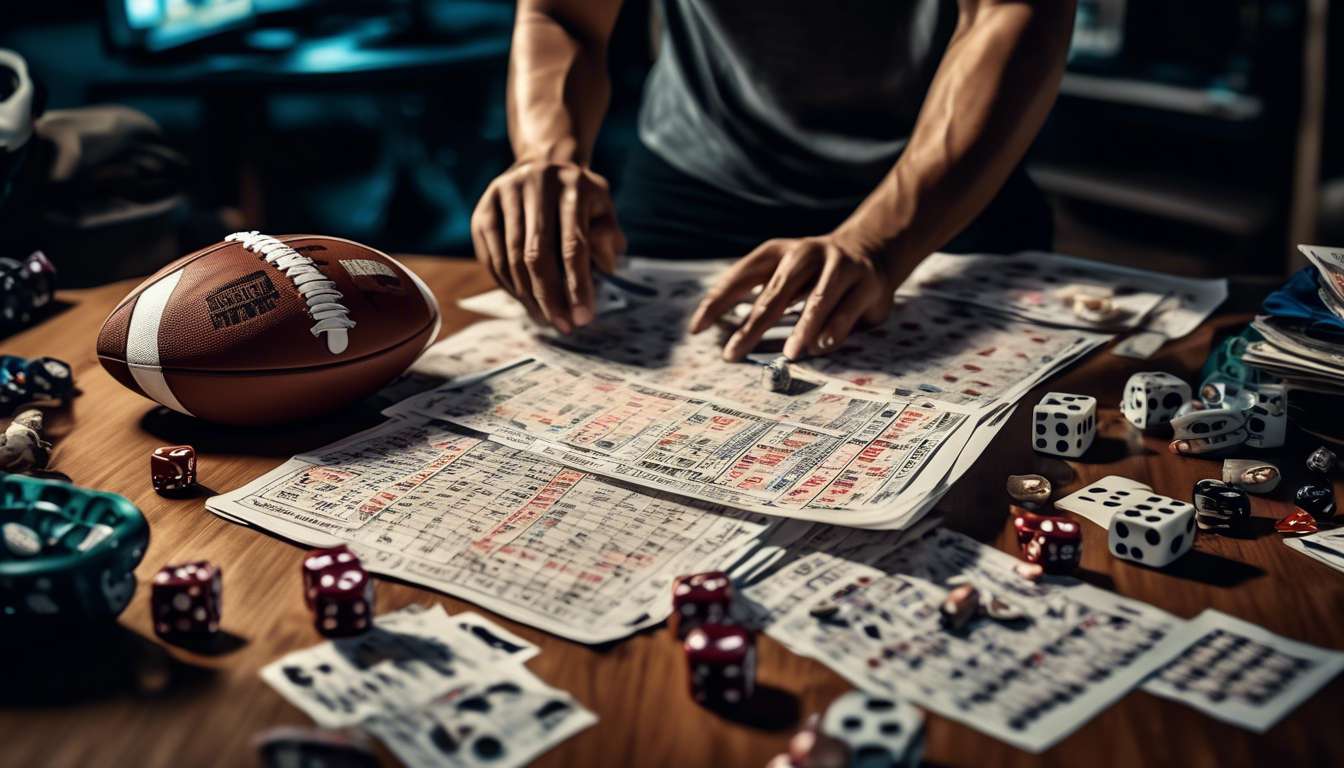We all know the thrill of placing a bet on our favorite sports team, the exhilarating hope that this time, luck will be on our side. Yet, as the final whistle blows and our bets often fall short, we find ourselves asking: why is it so challenging to come out on top in sports betting?
Despite our careful analysis and gut instincts, the reality is that the odds are meticulously stacked against us. The sports betting industry is designed with intricate algorithms and statistical models that favor the house.
As we dive into the complexities of how odds are calculated, we begin to understand the reasons behind our elusive quest for victory:
-
Complex Algorithms and Statistical Models:
- The house uses advanced models to ensure their profit margins.
- Odds are set to reflect not just the likelihood of an event, but also to balance the book and manage risk.
-
Unpredictable Nature of Sports Events:
- Sports are inherently unpredictable, with countless variables such as player injuries or weather conditions impacting the outcome.
- This unpredictability makes it difficult to consistently make correct predictions.
-
Psychological Factors:
- Our decisions are often influenced by emotions and biases, leading to irrational betting behavior.
- The thrill of potential victory can cloud our judgment, making it harder to make logical choices.
Join us as we explore strategies that might just tilt the odds in our favor and navigate the psychological factors that influence our decisions. By understanding these elements, we can better grasp why sports betting feels like an uphill battle, and perhaps, find ways to improve our chances of success.
The House’s Advantage
In sports betting, the house always maintains an edge that ensures they profit over the long run. We’re all in this together, trying to beat the odds, but the reality is that the house thrives on unpredictability. They’ve designed the system to keep us coming back, hoping that this time, we’ll come out on top.
Odds are set in a way that reflects the likelihood of an event, but they also incorporate a margin that favors the house. This subtle advantage is often overlooked as we place our bets, driven by the thrill of the game. We chase the adrenaline and the sense of belonging among fellow bettors, but our biases can cloud our judgment.
These biases, whether it’s:
- Overestimating a favorite team
- Underestimating an underdog
play right into the house’s hands. They count on us to make impulsive decisions, swayed by emotions rather than logic. In this game of chance, the house’s advantage is a constant reminder of the uphill battle we face.
Calculating the Odds
When we calculate the odds in sports betting, we’re essentially trying to quantify the probability of an event occurring while accounting for the house’s built-in margin. This process is not straightforward, as we must navigate the complexities of unpredictability inherent in sports.
Odds are more than just numbers; they represent our collective attempt to make sense of a game’s uncertain nature.
In our community of bettors, we all share a common challenge: overcoming our biases. These biases can cloud our judgment, leading us to misinterpret odds or overestimate a team’s chances. Common biases include:
- Favoring our hometown team
- Relying too heavily on past performance
By recognizing these biases, we can approach the odds with a clearer mind.
As we delve deeper into the numbers, we find camaraderie in our shared pursuit. Analyzing odds becomes a collective journey, where our insights and experiences help each other navigate the unpredictable world of sports betting.
Together, we strive for understanding and success.
Impact of Unpredictability
In the world of sports betting, we constantly grapple with the inherent unpredictability that makes consistently winning such a formidable challenge. Despite our best efforts to calculate the odds, the unpredictable nature of sports events keeps us on our toes.
We share in the thrill and uncertainty, knowing that every game carries surprises that defy even the most calculated predictions. This unpredictability is what draws us together, creating a community of bettors who understand the highs and lows of the game.
Our biases often cloud our judgment, skewing the odds we perceive.
- We might favor a team or player due to past performances.
- Personal preferences can also influence our betting choices.
However, this doesn’t always align with actual outcomes. The unpredictability inherent in sports means that even the underdog can triumph, leaving us to reevaluate our strategies.
By embracing this uncertainty, we can connect with fellow enthusiasts, learning and growing in our shared pursuit of mastering the elusive art of sports betting.
Variables in Sports Betting
In sports betting, several variables such as player performance, weather conditions, and team dynamics play crucial roles in determining outcomes.
When we dive into the odds, we realize they’re not just numbers but reflections of complex scenarios influenced by these factors.
- Player injuries or sudden dips in performance can unexpectedly shift the betting landscape.
- Weather conditions, often overlooked, can dramatically impact game dynamics, especially in outdoor sports.
- Team dynamics can change drastically, where a single player’s morale can sway the entire team’s performance, adding another layer of unpredictability.
As a community of sports enthusiasts, we’re drawn together by our shared passion for the game. However, we must acknowledge the biases that can cloud our judgment. We often lean towards favorites or underdogs based on personal perceptions rather than factual analysis, affecting our betting decisions.
Recognizing these variables helps us appreciate the intricacies of betting, reminding us that it’s not just luck but an understanding of the game’s multifaceted nature.
Emotional Decision Making
Emotional Decisions in Sports Betting
Emotional decisions often cloud our judgment in sports betting, leading us away from rational analysis.
We’re all drawn to the excitement and camaraderie that sports bring, but this can sometimes skew our perception of the odds. When we let our hearts take the lead, we might bet on our favorite team, regardless of their form or the unpredictability of the game. This approach sidelines logical evaluation, and we end up making choices based on biases rather than facts.
The Impact of Emotional Biases
We crave the thrill of being part of something bigger, and that desire can amplify our emotional responses. The unpredictability of sports adds to the allure, but it also means outcomes aren’t always in line with our expectations or personal loyalties.
- Betting on favorite teams
- Ignoring team form and performance
- Overlooking unpredictability
Striving for Rational Decisions
By acknowledging these biases, we can strive to make decisions that are more informed and objective. Together, we can navigate the world of sports betting with a clearer understanding, seeking to balance our emotions with sound judgment.
To improve decision-making:
- Recognize emotional influences.
- Analyze team performance and statistics.
- Balance personal biases with factual data.
By following these steps, we can enhance our judgment and make more rational betting choices.
Cognitive Biases in Betting
In sports betting, cognitive biases often lead us astray by distorting our perception of probabilities and influencing our decisions based on flawed reasoning. We think we’re making rational choices, but biases like the gambler’s fallacy and confirmation bias cloud our judgment.
The unpredictability of sports only adds to the challenge, making it easy to overestimate our ability to predict outcomes.
We often trust our instincts, believing we can outsmart the odds, but this confidence can be misleading. When we focus on past successes, we ignore the inherent unpredictability of each game. At times, we might lean towards a favored team, not because of their current form, but due to our emotional attachment. This bias skews our perception of the actual odds.
As a community, we share these experiences, understanding that biases can unite us in our struggles and triumphs.
Acknowledging these biases and supporting each other can help us navigate the complex world of sports betting together.
Strategies to Improve Odds
To boost our chances in sports betting, we should focus on informed decision-making and disciplined bankroll management.
Key Strategies for Informed Decision-Making:
- By analyzing stats and trends, we can make educated guesses rather than relying on hunches.
- This approach helps us navigate the inherent unpredictability of sports, tipping the odds slightly in our favor.
Bankroll Management:
- It’s essential to resist the urge to chase losses, as this could lead to poor decisions driven by emotion rather than logic.
Overcoming Biases:
- We need to acknowledge our biases and strive to see past them.
- Whether it’s overestimating our favorite team or underestimating an underdog, biases can distort our judgment and cloud our analysis.
- By being aware of these tendencies, we can make more objective choices.
Community and Mindset:
- Foster a supportive community of like-minded bettors who seek growth and improvement.
- Cultivate a mindset focused on long-term success rather than quick wins.
- By sharing strategies and learning from each other’s experiences, we can improve our odds.
- Enjoy the camaraderie that comes with responsible betting.
Together, by focusing on these strategies, we can enhance our sports betting experience and work towards sustained success.
Navigating Psychological Influences
Navigating the Psychological Influences in Sports Betting
To successfully navigate the psychological influences in sports betting, it’s crucial to recognize and manage the emotions that can lead to irrational decisions.
Key Challenges:
- The allure of favorable odds
- The thrill of unpredictability
These elements can often cloud our judgment. Our biases, such as overconfidence or the tendency to chase losses, can skew our perception, making it difficult to evaluate situations objectively.
Strategies for Improvement:
-
Acknowledge Biases: By recognizing these biases, we can begin to make more informed decisions.
-
Community Support:
- As a community of bettors, we share the desire to outsmart the unpredictable nature of sports.
- Remember that no matter how much we analyze, there’s always an element of chance.
- Our shared experiences can help us stay grounded.
-
Open Discussions:
- Discussing wins and losses openly cultivates a sense of belonging.
- Learn from each other’s mistakes.
Conclusion:
Together, we can strive to keep emotions in check and approach betting with a clearer, more rational mindset. This collective approach enhances our chances of success.
Conclusion
In the world of sports betting, the odds are stacked against you. The house always maintains the upper hand, making it a challenging endeavor.
Factors that contribute to this difficulty include:
- Unpredictability
- Emotional decisions
- Cognitive biases
To improve your chances of success, focus on the following strategies:
-
Understand the Variables: Gain a thorough understanding of the factors that can influence the outcome of sports events.
-
Manage Emotions: Keep emotions in check to prevent them from clouding your judgment and leading to impulsive decisions.
-
Employ Strategic Approaches: Develop and implement strategies that enhance your decision-making process.
Remember, it’s not just about luck—it’s about smart decision-making and staying ahead of the game. Good luck out there!

